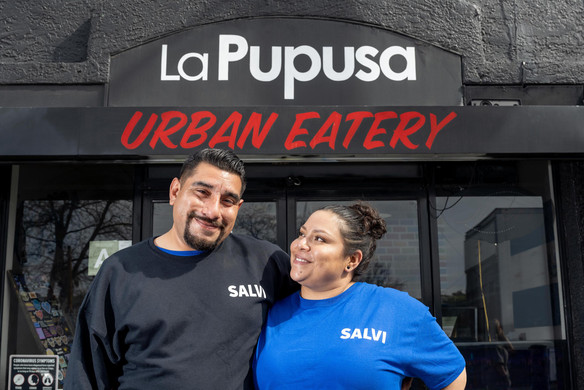Table of contents
La Pupusa Urban Eatery was compensated for their time and participation by Square.
Juan Saravia’s parents came to America as immigrants, planting roots in this country with a true mom-and-pop shop restaurant. The restaurant was first sold to his parents by his uncle before he and his co-founder and wife Stephanie Figueroa launched their own restaurant with La Pupusa Urban Eatery. Both Saravia and Figueroa are Salvadorian and Los Angelenos, and their food reflects their shared heritage but with a more modern twist.
“My grandma is a legacy, a legend here in L.A. to anyone in the Salvadorian culture who was here in the 70s and early 80s,” said La Pupusa Urban Eatery co-founder Stephanie Figueroa. She grew up watching her grandma selling Salvadorian food out of a cart at a popular market called El Liborio. After both Figueroa and Saravia’s grandmothers passed the same year, they were inspired to make the restaurant a success.
“We didn’t see ourselves in all the traditional Salvadorian places. We decided we needed to make something that was a little different, that was more towards us, towards our community— people who are a little younger,” said Figueroa. “We still bring in all the traditional flavors of El Salvador that we grew up with, so I’m sure that my mom and my dad and the grandmas are okay with it. But we also have something for us and for our kids, who maybe don’t see themselves exactly as full Salvadorian.”
Time is money
From the start, the duo took on the challenge of evolving their way of thinking. Unlike traditional Salvadorean restaurants like Saravia’s parents, they sought to make theirs more accessible to a wider group of customers by accepting different forms of payments. “They wouldn’t do credit cards, they would hate that, they would prefer cash,” said Saravia, adding that his parents’ restaurant was traditional in many ways, featuring a Spanish-only menu.
Quick access to the business’s cash has made all the difference for the restaurant. The time it takes for cash to appear in a bank account from a customer payment is crucial. Having access to funds instantly allows them to plan ahead for the business. “A lot of us don’t have the leeway to hold on those two days. We need that money to keep the business going same-day. Payroll comes in, taxes come in every week. That’s something that has to be paid,” said Saravia. They set aside a percentage of daily sales automatically in order to cover taxes or any unexpected expenses.
Planning ahead would make all the difference when the pandemic started, as Figueroa and Saravia were able to tap into their savings, retain many of their employees, and continue to operate their business.
Reinvesting into the business
“We had taken out Square Loans to help out with certain expenses, like when we bought equipment to start doing our catering,” said Saravia. “Because we’re doing our expansion, we took out another loan and we paid some of the city fees to try to get more of our expansion going.”
Saving for a rainy day came in handy when unexpected expenses popped up. In addition to the plans already in motion for the restaurant, Figueroa says they were forced to make changes as customer behavior changed during the pandemic. “We went from having lines out the door to just trying to be able to find flour. Immediately we closed down,” said Figueroa. Figueroa and Savaria took the opportunity to start making merchandise, selling online, and finding other ways to connect with customers. Having savings to fall back on and securing a PPP loan both contributed to an extended runway for the business during a tough time. While the pandemic has slowed some of their initial plans around the expansion, it is still moving ahead.
One of the biggest lessons, says Saravia, was changing how he looked at finances, thinking about them from a business lens rather than a personal one. “For many years, I didn’t take care of my credit. Because I went to college and, like a lot of us, we get cards and we think we know what we’re doing. It took me a long time to understand how to take care of my finances even better,” said Saravia. “I learned that if we’re going to be doing this, the business has to be paying for things itself, not coming out of our pockets.”
For La Pupusa Urban Eatery, reinvesting into the restaurant is more than a business decision, it paves the way to a continued family legacy. “We try to save as much as we can put away, wherever we can, because just like we were able to benefit from our generational wealth, we want to pass the same thing on to our kids,” said Figueroa.
![]()











